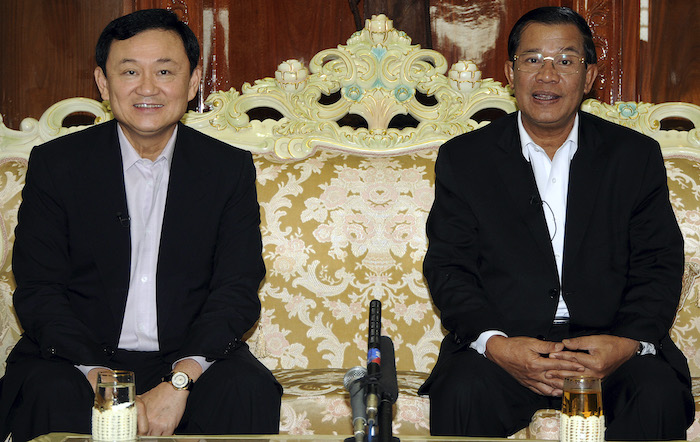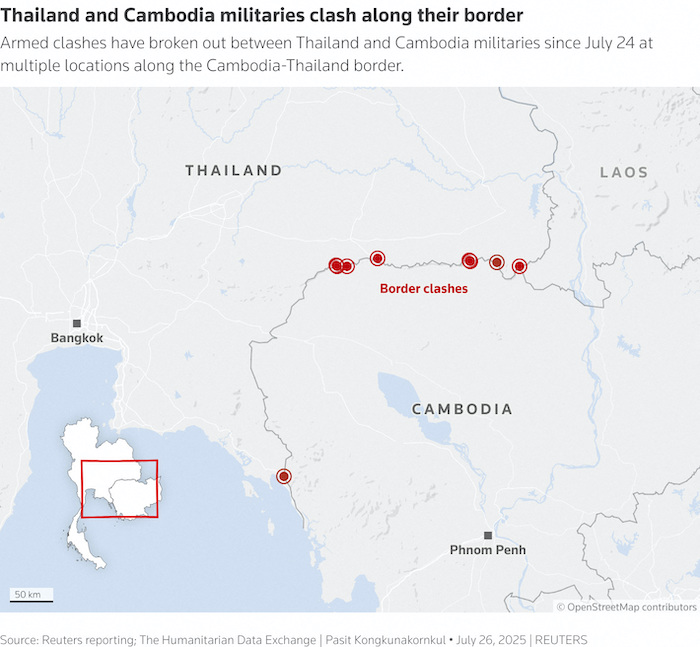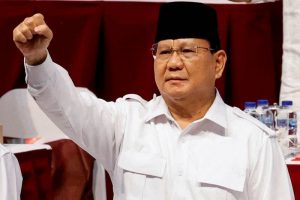The leaders of Thailand and Cambodia have accepted global calls for an immediate and unconditional ceasefire on Monday, according to reports from Malaysia, where heads of the two nations met for peace talks.
Cambodian Prime Minister Hun Manet and Thai acting Prime Minister Phumtham Wechayachai both said they would end five days of border clashes, Malaysian PM Anwar Ibrahim said. He spoke in his capacity as the current head of the ASEAN regional bloc.
At least 36 people were killed in their deadliest clashes in over a decade, which saw the use of heavy artillery and bombing by fighter jets. More than 300,000 people were displaced by the fighting. Half of those killed were soldiers on both sides, and the rest civilians.
ALSO SEE: EU Strikes a Pricey Deal With Trump to Avert a Trade War
The two leaders agreed to end hostilities, resume direct communications and set up a mechanism to implement the truce, Reuters reported.
The peace talks in Putrajaya were supported by the United States, China and the Association of Southeast Asian Nations.
Following more than two hours of talks in Putrajaya, Anwar, flanked by Thai and Cambodian leaders, said he was ready to deploy a team to observe and ensure implementation.
“This is a vital first step towards de-escalation and the restoration of peace and security,” he told a press conference.
“All parties shared a commitment to peace.”
Cambodian motive ‘tied to scam centre crackdown’
Thailand and Cambodia have a bitter history of fighting near their 817-kilometre-long border. The two sides have been on a tense footing since the killing of a Cambodian soldier in a skirmish late in May, which led to a troop buildup on both sides.
The clashes occurred at a time when Thailand’s fragile government is on the brink of collapse, following the resignation of a major party in the coalition.
Former prime minister Paetongtarn Shinawatra was forced to stand down earlier this month, pending a court hearing, after the leak of a damaging phone call by Cambodia’s long-term leader Hun Sen.
Hun Sen may have been upset at the Shinawatra government’s plan to set up casinos in Thailand – a proposal that would likely be a deep blow to the Cambodian economy, if it was to proceed.
Cambodia has also been hit by a Thai crackdown on operators of scam centres over the border, while the tariff push by the Trump Administration will likely cause severe damage to both countries’ economies.
On Sunday, the ruling Pheu Thai Party in Bangkok said the root issue behind the border clashes was Cambodian leaders’ anger at Thailand’s efforts to dismantle scam operations based in their country.
A party spokesman said Phnom Penh had refused to join a planned trilateral mechanism involving Thailand, Laos, and Myanmar to jointly tackle transnational cybercrime, saying it would handle the matter independently.
“It’s not a conflict between individuals or political dynasties like the Shinawatra and Hun Sen families,” MP and spokesman Danuporn Punnakanta was quoted as saying by the Bangkok Post. “It’s about the fallout from cybercrime suppression. Key figures in Cambodia are being affected, and there is growing evidence to support this.”
He noted an arrest warrant issued for Kok An, a Cambodian casino operator who is alleged to back scam centres in the border town Poipet and reportedly close to Hun Sen, who is now Cambodia’s Senate President. Thai officials have raided properties Kok An owns in Thailand and frozen significant assets, while pursuing international legal action with Interpol.

Former Bangkok Post editor Veera Prateepchaikul wrote on Monday that several factors are thought to be responsible for Hun Sen’s recent actions, “including a far-fetched yet plausible theory that he needs a dramatic event to fuel patriotic sentiments among the Cambodian masses to distract their attention from his government’s failures to address economic problems.
“His loss of revenue from the casinos and scam activities when Thailand closed the border may also weigh heavily on this dangerous adventure. As a true dictator, Hun Sen has no regard for the plight of those subject to his regime’s misrule as long as his family comes first and remains filthy rich.”
Even Trump had his say
Meanwhile, both Paetongtarn and her father Thaksin face court cases that could lead to the government’s collapse – and possibly the end of Shinawatra governments.
With this sort of upheaval rocking the heavyweights in both countries, it is perhaps no surprise that trouble has flared on the border.
The two sides accused each other of starting the fighting last Thursday, before quickly deploying heavy artillery at multiple points along their 800-km (500-mile) land border. Thailand flew air raids with an F-16 fighter jet.
US President Donald Trump was even involved, calling both leaders on the weekend and warning he would not conclude trade deals with them unless they ended the fighting. Both sides are facing a steep import tariff of 36% on their goods in the US, their top export market.
Today, Cambodian Prime Minister Hun Manet thanked his acting Thai counterpart Phumtham Wechayachai for what he said was a positive role and said he deeply appreciated Trump’s “decisive mediation” and China’s constructive participation.
“We agreed that the fighting will stop immediately,” he said, expressing confidence that both sides could rebuild trust and confidence.
“The solutions proposed by Prime Minister Anwar will set the conditions for moving forward with bilateral discussions, returning to normalcy, and forming the foundation for future de-escalation.”

Border villages rocked by violent power play
Thai leader Phumtham, who had expressed doubts about Cambodia’s sincerity, said Bangkok had agreed to a ceasefire that would be “carried out successfully in good faith by both sides”.
“Today’s outcome reflects Thailand’s desire for a peaceful resolution by continuing to protect our sovereignty and the life of our people,” he said, thanking Trump and Malaysia.
The fighting has scarred border communities on both sides.
In Thailand’s Sisaket province, a house lay reduced to splintered wood and twisted beams after being struck by artillery fire from Cambodia. The roof had caved in, windows hung by the frame and power lines drooped over the structure.
Amid the din of occasional artillery fire, homes and shops remained shut and a four-lane road was deserted except for a few cars and military vehicles.
Dozens of displaced residents lined up quietly for their evening meal at an evacuation centre about 40km away from the frontlines.
A few children played with dogs, others swept the dusty floor.
Fifty-four-year-old Nong Ngarmsri just wanted to go back to her village.
“I want to go to my children who stayed back,” she said. “I want them to cease firing so that I can go home.”
- Jim Pollard with Reuters
NOTE: Further text and a pic of Thaksin and Hun Sen were added to this report on July 29, 2025.
























